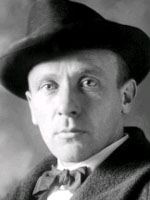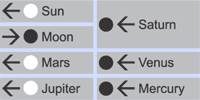Interesting facts
The father’s death (The Black Saturn)
The biggest nightmare of the childhood for extremely vulnerable and impressionable Misha Bulgakov became his father’s untimely death. Athanasius I. Bulgakov died on March 14, 1907 of nephrosclerosis. He was ill not for a long time, and the death of the head of the family fell on the members like a bolt from the blue. Fifteen year old Misha coped with the stroke of fate the hardest. Undoubtedly, purely boyish pride, heightened sense of self-esteem, love of freedom, touchiness, insecurity, stubbornness, and even arrogance rooted in his temper forever since then. These features were clearly manifested later in well-developed man and largely determined his behavior in some situations.
Surprisingly, the writer, as well as his father, died in early March of the same disease - malignant nephrosclerosis. The age difference with the father was only one year.
The master of the literature and theater (The White Sun, The White Mars)
Almost all Mikhail Bulgakov’s works are autobiographical to some extent. Anyway, all his novels, a significant part of plays, some short novels and short stories can be characterized this way. Bulgakov worked with a variety of literary genres, but he treated his theatrical activities with particular enthusiasm. "He had a gift of a great, courageous and unexpected storyteller. He came to the theater with a rich life experience, which got new, sometimes paradoxical imagery in his stories. He knew how to inspire actors. He brought passion and the search to the life of the theater and discovered more and more qualities in his literary images. He was a great actor not only potentially, but also actually. Perhaps, this quality determines the true essence of the playwright, as a good playwright is likely and even necessarily an actor. If he was asked to play a piece of his own play, he would play it all and would do it perfectly. For example, in "Turbins" he showed almost all images, willingly and generously helping the actors. He was not only present at the rehearsals – he put the play" - recollects theater critic and director P. Markov.
Idea-driven (The White Sun)
Cinema and theatre actor M. Yanshin describes his impressions of the great writer in the mid-20s: "Always cheerful, easy-going, always well-groomed with a little up-and-down gait, witty, very easy going to all sorts of jokes and squibs, organizer of all sorts of games - "tiddly-winks", "pick-up sticks", etc, organizer of ski tours, he was tireless in organizing different activities, all kinds of prizes, conditions of the competition".
The hit with the ladies (The Black Venus)
Having an amazing magnetism, able to impress and pay court to women delicately, Bulgakov, undoubtedly, has always been the object of female attention and admiration. He was loved by absolutely gorgeous woman in different periods of his life. The apotheosis of his family life became the third wife, Elena S. Shilovskaya, who was mainly a prototype of Margarita. But this image of the perfect woman was completed with sacrificial love of his first wife, who saved her husband from the harmful addiction to morphine, and the spirit of the second one, a true aristocrat and a society woman, who brought him to the true Moscow intellectuals. Thus, Mikhail Bulgakov had three wives. He was breaking up with all of them except for the last one, by the way.
The dependence on morphine (The Black Moon, The Black Saturn)
According to the experts, Bulgakov's case is unique because a writer was predisposed to various dependencies by his nature. He was psychasthenic and anxious person, prone to depressions, anxieties, sleep disorders, hypochondria, headaches (he had sessions on psychotherapy and hypnosis on this occasion later) and was analyzing everything too much. Such people often become dependent on drugs. That is why the question how he was able to overcome the dependence on morphine remains a mystery. Apparently, his wife really helped him, she was his intuitive therapist. Evidently, she made him distillate injections and also gave him opium tincture to drink. Gradually, he overcame the injection depending and moved to the easier option – oral one. The dosage was reduced with the time, and Bulgakov managed to get rid of the dependence, but most important - he had a motivation. Only having it a patient can recover. Bulgakov had his work. The narcissistic soul of the writer demanded creation, presentation to the world. He couldn’t present himself in the form of a drug addict, on the contrary, he concealed this side of his life in every possible way, and then, with incredible efforts, he substituted one drug with another: he preferred creativity to morphine.
"A writer will always be in an opposition to the politics until the politics will be in the opposition to the culture" (The Black Mercury, The White Jupiter)
Bulgakov rebelled against ordinariness and vulgarity of the mind, the unnatural restrictions, felling, according to K. Paustovskii "intense and devastating hatred to everything, which had even the slightest traits of philistinism, savagery and hypocrisy".
Now it is impossible to imagine the painful atmosphere surrounding Bulgakov in the last decade of his life. His works were banned because of undermining the foundations of the Soviet regime, bulled in the press, or simply ignored. In his letter dated 1930, he appealed to Stalin with absolutely stunning by the courage words: "In the wide field of Russian literature in the Soviet Union, I was the one and the only literary wolf. I was advised to paint the fur. An absurd advice. It doesn’t matter if the wolf is painted or bobbed, he still does not look like a poodle". He was offered "to go to the factory and see how people work there" or "to write the revolutionary play" or "the declaration of acceptance of the socialism". Even people from the inner circle, those who were considered to be friends, said openly: "Surrender, they all have surrendered!" "To surrender", i.e. to start writing as it was required by the time, was not even the equivalent to death for Bulgakov, it was much worse, it would be a betrayal of the ideals, which the writer protected with purely children's reverence and romanticism.

